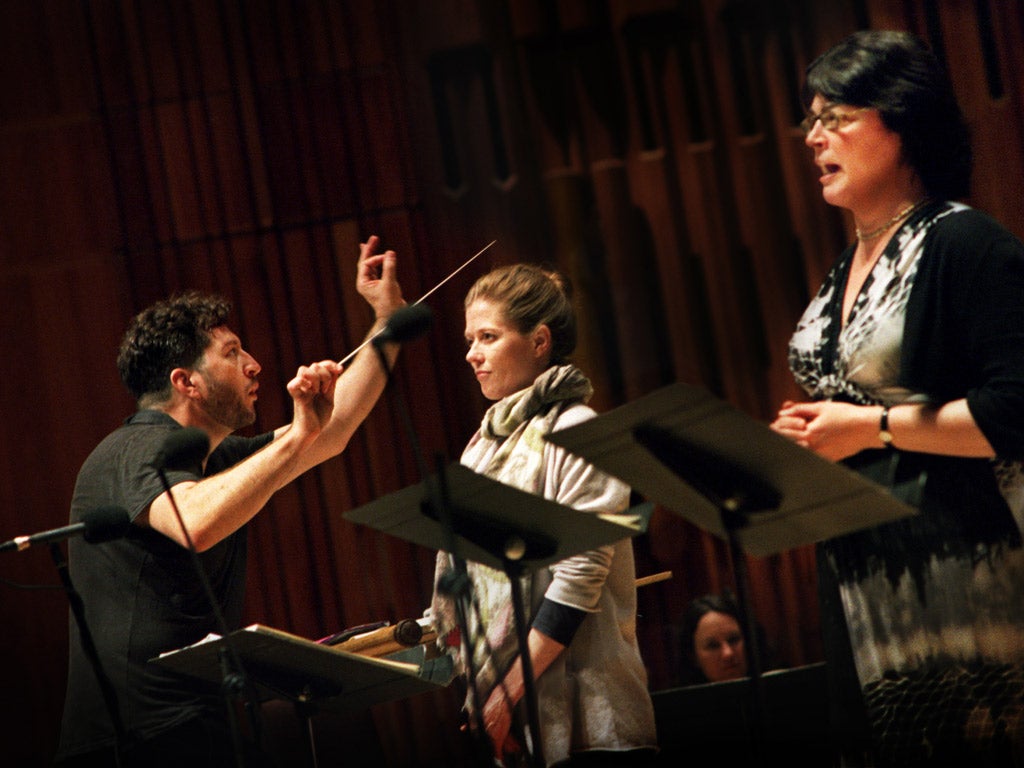The Importance of Being Earnest, Barbican Hall, London Royal Concertgebouw Orchestra, Barbican Hall, London OperaShots, Linbury Studio, Royal Opera House, London
Fast, funny and furious, Gerald Barry's adaptation of 'a trivial comedy for serious people' merits a full staging

Two megaphones, 40 dinner plates, a doorbell, a starter gun and the frenzied acceleration of a speech at the Nuremberg Rallies. Gerald Barry's operatic adaptation of The Importance of Being Earnest was never going to be twee.
Trimmed to a third of its length, punctured with Schoenberg, Beethoven, "The Last Post", crazy-mirror variations on "Auld Lang Syne"and two versions of Schiller's "Ode to Joy", Oscar Wilde's script has lost none of its "sincere and studied triviality". Here is Victorian England in all its snobbery, repressed sexuality, obsessions with provenance, addresses, incomes and propriety, scored for string quartet and double bass, a fruity harmonie band, squalling horns, madcap piano and cartoon percussion.
Conducted in concert by Thomas Adès, the UK premiere of Barry's latest opera was a manic, renegade thrill. Birmingham Contemporary Music Group's 24-piece ensemble navigated the switchback shifts from serial pastiche to Godzilla concerto grosso without breaking sweat or losing the tenderness behind this crockery-smashing mockery of the quartet of lovers (Barbara Hannigan, Katalin Károlyi, Peter Tantsits, Joshua Bloom), their pettish priest (Joshua Hart), giddy governess (Hilary Summers), morose butler (Benjamin Bevan) and monstrous matriarch, Alan Ewing's basso profundo Lady Bracknell. The dexterity of Wilde's wordplay remains crisp, the darker forces of violence and desire bubbling up like heartburn. Barry outstrips the screwball speed he set in The Bitter Tears of Petra von Kant (2005). Spat into a megaphone, declaimed, chanted, barked out in German, split into hiccuping clusters of mis-stressed syllables, whooping in and out of falsetto (Bloom) or pirouetting in the stratosphere (Hannigan), the singing of the cast is impeccable. The most confident, volatile comic opera for a decade, Earnest demands a full staging.
Was it human frailty or a desire to create contemplative space that inspired the long pauses between each movement of Nikolaus Harnoncourt's performance of Beethoven's Missa Solemnis with the Royal Concertgebouw Orchestra? Now 82 years old, and the latest recipient of the Royal Philharmonic Society medal, Harnoncourt shows no sign of slowing down. What was vital and urgent remains so – the acerbic accents of the Credo, the scalding sforzandi of the Agnus Dei. The limitless beauty essayed in the Benedictus is unclouded by sentiment, its violin solo the most persuasive, if tangential, response to Beethoven's study of Palestrina's polyphony: the music of angels who do not need to breathe.
For all Harnoncourt's meticulous shading, for all the viol-like solemnity of the strings, the ethereal sunburst of the Netherlands Radio Choir, the muscular glory of the brass, the devout eloquence of the vocal soloists, the Missa Solemnis remains unknowable. Beethoven, whose belief in God had little to do with organised worship, reveals his ambition in the Agnus Dei, in a section marked "Bitte um innern und äussern Frieden" (prayer for inner and outer peace), in music more disquieting than consoling.
ROH2's OperaShots series has focused on artists known in other fields. Nothing wrong with that, though similar projects at ENO and Manchester International Festival suggest that, outside the opera world, the defining features of opera are opulence and bombast. A sophisticated, experienced composer, Graham Fitkin is too smart to subscribe to those clichés. Home, devised with choreographer Jasmin Vardimon, unfolds in a series of variations that nod towards Monteverdi in intricate conversations between instruments and affectless vocal lines.
The scenario is familiar: a young couple in love (dancers Aoi Nakamura and Estéban Fourmi) take possession of a house haunted by half-seen figures (singers Melanie Pappenheim and Victoria Couper). Is the ensuing menace a metaphor for the disenchantments of marriage? Leaves blow in. Pictures fall down. The couple are trapped by a flurry of soprano saxophones as the walls disintegrate to reveal a continuo section of electronica, string instruments and percussion.
Neil Hannon's Sevastopol formed the second half of the double bill – based on Tolstoy's memoirs of the battlefields of the Crimea. Front man of the Divine Comedy, Hannon has a gift for pastiche, most obviously in the klezmer stylings of the street pedlar's song. His orchestration is light and attractive, even as limbs are being hacked off in the field hospital. The overall impression is of a state-approved 1940s Soviet morale-booster. The Wound Dresser, it ain't.
Critic's choice
Turn on, tune in, wander out, come back for more. Philip Glass's 1976 opera Einstein on the Beach hits the Barbican Theatre, London (from Fri). In Manchester, Sir Mark Elder conducts the Hallé and soloists Brindley Sherratt, Alice Coote, Rebecca Evans, and others in Elgar's rarely performed oratorio The Apostles, at Bridgewater Hall (Sat).
Subscribe to Independent Premium to bookmark this article
Want to bookmark your favourite articles and stories to read or reference later? Start your Independent Premium subscription today.

Join our commenting forum
Join thought-provoking conversations, follow other Independent readers and see their replies